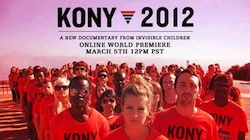In the past week, the ‘Stop Kony’ campaign, aimed at the arrest of African ‘warlord’ Joseph Kony, leader of the Ugandan Lord’s Resistance Army, has become an unlikely internet phenomenon.
There is an undoubted justice to the campaign to the extent that, as the LRA leader, Kony is responsible for crimes against humanity stretching back many years. He ought to face justice, whether in Uganda or in the International Criminal Court.
However, as seems to be the way with such ‘viral’ internet activism, the Kony campaign simplifies to the point of misrepresentation the complex political problems that underlie such conflicts. Presented as a crude ‘let’s get the bad guy’ issue, the video at the heart of the campaign pretends that such problems are simple enough to be understood by a child.
 In a perceptive commentary on ‘the perils of conflict for a Facebook world’, Uganda expert Jonathan Fisher of the International Development Department of Birmingham University makes some telling points.
In a perceptive commentary on ‘the perils of conflict for a Facebook world’, Uganda expert Jonathan Fisher of the International Development Department of Birmingham University makes some telling points.
Fisher reminds us that it does no-one any good to ‘depict African violence as incomprehensible, illogical and ‘solvable’ by ‘taking out bad men’ like Kony’. ‘Crimes such as those committed in Kenya in 2007 or in Rwanda in 1994’, he goes on, ‘do not happen because of any cultural predisposition to random, unintelligible outbreaks of communal blood-letting.’ Rather, they are political conflicts with a logic of their own that needs to be grasped if lasting peace is to be achieved. The neglect – at best – of northern Uganda by the Museveni regime mean that anti-government sentiments will not disappear with the arrest of Kony, Fisher claims.
Secondly, Fisher points out (as others have done) that the Ugandan government is hardly an innocent by-stander in the conflict and is also guilty of human rights abuses as well as increasingly authoritarian tendencies and of reneging on peace agreements.
While casting doubt on the claimed inability of Uganda to deal with the LRA, Fisher argues that the Stop Kony campaign helps to bolster the Ugandan government’s presentation of itself to western backers as an ally against terrorism. This positioning has seen western governments supply military backing to Kampala for a number of years. Indeed, the tangible focus of the latest phase of the Stop Kony campaign is to ensure that US military aid to Uganda to track down Kony, in the shape of 100 special advisers, is continued.
As has been the case at many times in the past – the Live8 and Make Poverty History campaigns chief among them – Africa becomes what Graham Harrison called ‘a distant other’, deserving of often fleeting, emotional sympathy while political sense and analysis goes out of the window. However much we may support the call for Kony to face justice, Fisher’s comments remind us not to neglect the politics of this and other conflicts.
—-
Jonathan Fisher, ‘Stop Kony and the perils of conflict for a Facebook World’
Graham Harrison (2010) ‘The Africanization of Poverty’ African Affairs vol 109 no.436


